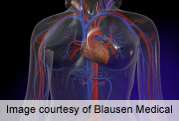For patients with type 1 and type 2 diabetes, severe hypoglycemia is associated with severe hypertension, hypokalemia, and QT prolongation, according to a study published online Aug. 12 in Diabetes Care.
(HealthDay)—For patients with type 1 and type 2 diabetes, severe hypoglycemia is associated with severe hypertension, hypokalemia, and QT prolongation, according to a study published online Aug. 12 in Diabetes Care.
Tetsuro Tsujimoto, M.D., from the National Center for Global Health and Medicine in Tokyo, and colleagues conducted a retrospective cohort study to assess vital signs, QT intervals, and newly diagnosed cardiovascular disease during severe hypoglycemia in patients with type 1 and type 2 diabetes. A total of 414 cases of severe hypoglycemia that could not be resolved by the patients themselves in a pre-hospital setting were included in analyses.
The researchers observed no significant difference in the median blood glucose levels between patients with type 1 (88 patients) and type 2 (326 patients) diabetes. In the type 1 diabetes group, the incidences of severe hypertension, hypokalemia, and QT prolongation were 19.8, 42.4, and 50.0 percent, respectively. For patients with type 2 diabetes, the corresponding proportions were 38.8, 36.3, and 59.9 percent, with a significant difference for the incidence of severe hypertension between the groups. Only in the type 2 diabetes group were newly-diagnosed cardiovascular disease during severe hypoglycemia (1.5 percent) and death (1.8 percent) observed. There was a significant difference in the type 2 diabetes group for blood glucose levels between the deceased and surviving patients.
"Type 1 and type 2 diabetic patients with severe hypoglycemia experienced many critical problems that could lead to cardiovascular disease, fatal arrhythmia, and death," the authors write.
More information:
Abstract
Full Text (subscription or payment may be required)
Journal information: Diabetes Care
Copyright © 2013 HealthDay. All rights reserved.





















